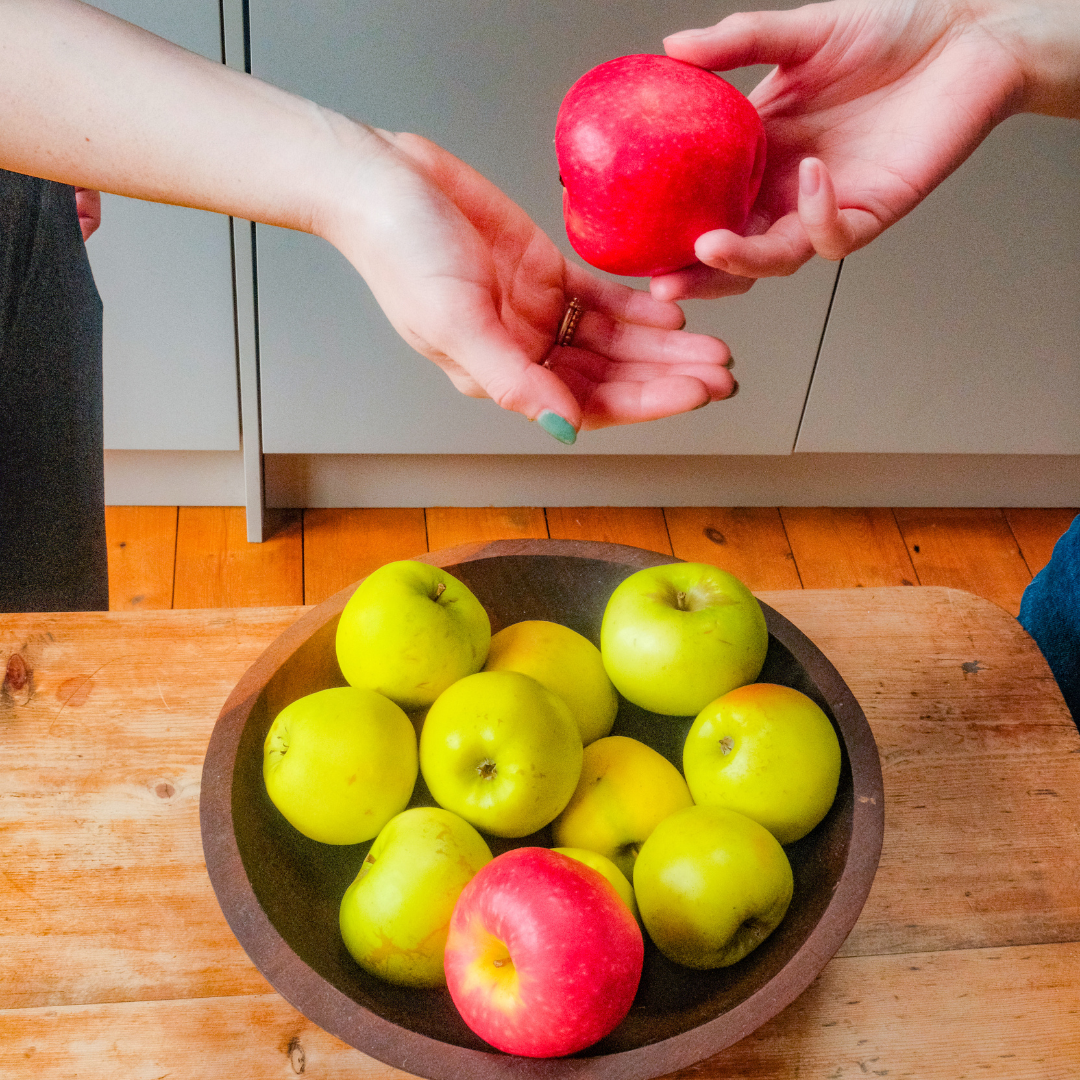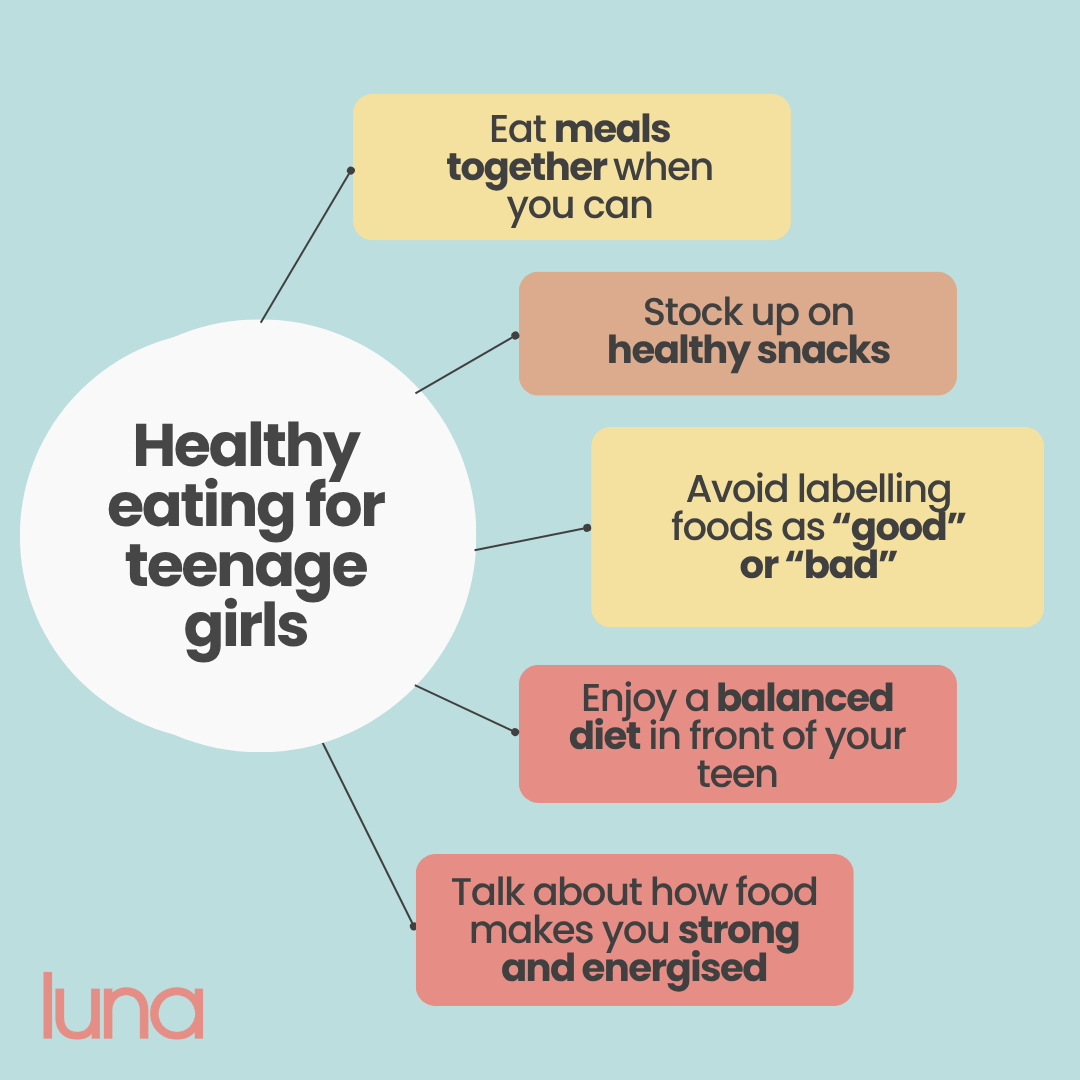Healthy eating for teenage girls
How to support your daughter

Updated November 19, 2025 • Medically reviewed by Dr. Emma Dickie
Medically reviewed by Dr. Emma DickieIn this article
Quick summary
- Teens need a balance of nutrients for growth, hormone balance, and brain health
- Gentle encouragement and positive role modelling work better than pressure or restriction
- Building a relaxed, healthy relationship with food now sets your teen up for lifelong wellbeing, and if you need support with this, luna has lots of positive content about healthy eating that's reviewed by medical experts and put forward in a way that's always mindful of how vulnerable these discussions can be with young people

Eating habits can be a bit all over the place during the teenage years.
Growth spurts, hormonal changes, and social pressures all can affect appetite, body image, and food choices.
This means your teen's diet may not be ideal all of the time.
But getting your teen to eat better often starts with small, consistent changes and a lot of patience.
Things like family meals, smart swaps, and positive food talk go a long way.
As a parent, it’s not about getting every meal “perfect,” but about creating balance, support, and healthy attitudes toward food that will last.
What does your daughter need to eat?
Teen girls need a mix of nutrients to fuel their busy brains and growing bodies.
Here are some key ones to keep in mind:
- Protein: for muscle growth, hormones, and repair (think chicken, eggs, beans, or tofu)
- Iron: especially important once periods begin – helps prevent tiredness and boosts concentration (found in lean meat, lentils, spinach, and fortified cereals)
- Calcium and vitamin D: for strong bones and teeth during peak growth years (dairy, fortified plant milks, or tinned fish)
- B vitamins: for energy and mood regulation (whole grains, eggs, nuts)
- Healthy fats: for brain development and hormone balance (avocados, olive oil, salmon, walnuts)
A balanced diet doesn’t have to be complicated. It’s about variety, colour, and consistency over time, not perfection every day.
You may wish to explore daily vitamins for teenage girls to help them get everything they need.
How do I get my teenage daughter to eat better?

When it comes to food in teens, you may feel like you are walking a very fine line.
You want them to have a healthy relationship with food, but you don’t want them to skip breakfast every day and live off beige snacks and energy drinks.
Focusing on shaping a positive food environment rather than strict control can help – you don't want to become an almond mum!
Your influence as a parent (and the one who buys the food) is powerful.
Here are a few ways to gently guide your teen towards better habits:
- Eat together when you can: family meals are linked with better nutrition, confidence, and communication – even a couple of dinners a week count
- Stock up on simple, healthy snacks: teens are often on the go, so think cut fruit, yoghurt, nuts and dried fruits, or wholegrain crackers instead of crisps or sweets
- Skip the food guilt: avoid labelling foods as “good” or “bad” (which is what an almond mum might do) – instead, talk about “everyday” foods for fuel and “sometimes” foods for fun
- Be the example: when your teen sees you enjoying balanced meals, without dieting or complaining about calories, it sets the tone
- Shift the focus: talk about how food makes them feel strong and energised, not how it changes how they look
How to encourage a healthy relationship with food
Healthy eating isn’t just about nutrients. It’s about mindset. The way your teen feels about food can shape their habits for years to come.
Teens today are bombarded with messages about “clean eating,” diets, and body ideals online.
Between the TikTok chubby filter trend and the viral salt water flush diet, it’s easy for food to feel like something to control or worry about, rather than enjoy.
Helping your daughter build a relaxed, balanced view of food can protect them from that pressure.
Here’s how to start:
- Be mindful of body talk: try not to comment negatively about your body or anyone else’s – teens learn how to think about their own appearance by watching you
- Talk about social media: ask who she follows and encourage creators who show real meals, body diversity, and balance instead of restriction
- Normalise flexibility: pizza nights, snacks, or desserts aren’t “cheats” – they’re just part of living a fun and fulfilling life!
The goal isn’t to control what they eat, but to help them feel confident and mindful around food.
When should I worry about eating habits?
Most changes in appetite or eating patterns are just part of growing up.
But sometimes, they can hint at something more.
If your teen is skipping meals regularly, showing a lot of stress around food, or expressing worry about their body, it’s worth checking in.
A gentle “I’ve noticed you haven’t been eating much lately, how are you feeling?” can open the door.
The same goes for if they're suddenly eating a lot more than usual.
If you’re worried, talk to your doctor or a healthcare professional who understands teen nutrition and mental health.
Helping your teen build lifelong habits
Healthy eating for teenage girls isn’t about perfection; it’s about progress.
Every meal, snack, and conversation is an opportunity to support their growing independence and self-esteem.
Keep talking about food in a positive way. Eat together when you can. And remind them that balance, not restriction, is what helps her feel her best.
When healthy eating feels natural and relaxed, your teen is far more likely to make good choices and to enjoy them, too.
And if you ever need a helping hand, luna has lots of positive content about healthy eating that's reviewed by medical experts and put forward in a way that's always mindful of how vulnerable these discussions can be with young people.

How we created this article:
luna's team of experts comprises GPs, Dermatologists, Safeguarding Leads and Junior Doctors as well as Medical Students with specialised interests in paediatric care, mental health and gynaecology. All articles are created by experts, and reviewed by a member of luna's senior review team.
Sources:
NHS "Vitamins and minerals" | Accessed 14.11.25
https://www.nhs.uk/conditions/vitamins-and-minerals/NHS "The Eatwell Guide" | Accessed 14.11.25
https://www.nhs.uk/live-well/eat-well/food-guidelines-and-food-labels/the-eatwell-guide/NHS Wales "Healthy eating for teenagers" | Accessed 14.11.25
https://bcuhb.nhs.wales/health-advice/best-start/your-child/food/parents-teenagers/We'd love to keep in touch!
Sign up to our parent newsletter for emails on the latest teen trends, insights into our luna community and to keep up to date
By signing up, you are agreeing that we can use your email address to market to you. You can unsubscribe from marketing emails at any time by using the link in our emails. For more information, please review our privacy statement.